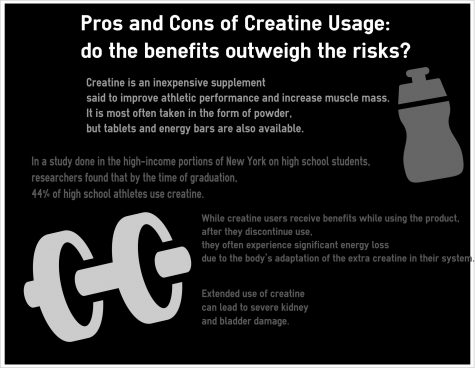Creatine leads to problems in athletes

Since athletes are always looking for an edge on the competition, it seems only logical that the easiest place to start is drugs. As performance-enhancing drugs are continually banned by organizations such as the World Anti-Doping Agency, athletes are forced to turn to naturally-occurring drugs such as creatine. While creatine has a variety of good uses outside of sports, it has similar effects to other banned drugs and should not be used by athletes.
A naturally occurring amino acid, creatine is found in certain meats and fish and is made by the human body in the liver and kidney. During high-intensity workouts such as weight-lifting, creatine is often quite effective in raising the amount of energy available for the workout. However, athletes with high amounts of creatine already in their digestive system do not tend to receive any benefits from added creatine supplements. In high doses of creatine, athletes can even have kidney failure or lose the ability in their body to produce natural creatine.
While creatine can boost performance, there are reasons why athletes choose to take creatine. Drugs such as creatine are also used as a way to recover from a workout faster than normal. According to the National Institute of Health, athletes in a recent study who were given creatine supplements recovered up to 35 percent faster than average. For athletes who participate in multiple activities a day, the added support to muscle structure is certainly welcome. This benefit does not pay off in the long run, however, because athletes who take creatine have shown more susceptibility to muscle cramps and other aspects of degraded performance as they age.
In the Minnesota State High School League, there are strict rules regarding the use of PEDs and other drugs such as creatine. As is commonly accepted in Minnesota high schools, colleges, and even professional sports, creatine is frowned upon and highly monitored, but is not a banned substance in its natural form.
As Athletic Director Ricky Michel explained: “In the MSHSL, creatine is frowned upon and certainly not accepted. In its powdered form, it has much greater effects and can sharply boost protein production. This form of creatine is currently banned for any athlete. Natural forms such as creams are not banned, however.”
There are also penalties and consequences associated with using banned substances while on an MSHSL high school team, including missing contests or not playing for the rest of a season. The penalties are very similar to underage drinking or smoking penalties. Just one offense of taking creatine could result in weeks of missing practices and games.
Part of the controversy over creatine results from overdosing because of lack of education about drug usage. In Texas, a recent study of high school athletes showed that most drug problems occurred because of a lack of education or misuse. As a result, Stillwater Area High School will be pushing for more programs to educate athletes about creatine (and other drugs) in the coming months, according to Michel. Not only will education about creatine help athletes make wise choices, but it will also provide a new opportunity for parents to get involved in an athlete’s decisions regarding drugs.
Creatine may be able to raise muscle strength in some individuals, but there are many risks associated with taking it and there is a lack of education around dosage. As a drug, creatine is more than just a naturally-occurring substance. It has the potential of causing irreversible damage to the body’s immune system and can also cause reproductive problems. Since it is frowned upon, has negative side-effects, and is often misused, creatine should not be taken as a supplement by athletes.








wazabiz • Apr 26, 2019 at 4:17 am
creatine does it work What is creatine “Creatine is an amino acid found in your body’s muscles, as well as in the brain,” explains Giamo. “The liver, pancreas, and kidneys also make creatine.” Its role in the body is to help stimulate the production of adenosine triphosphate (ATP), your main energy source. Foods, such as meat and seafood, contain it, as well. “It can also be made synthetically in the form of powders and supplements,” adds Giamo.When you exercise, you use energy and creatine. If you use it all, then this decreases the production of ATP, meaning that you’ll become very fatigued. This is why people turn to this supplement to increase their energy and muscle mass.
http://www.cureidea.com/creatine-muscle-builder-reviews/
Joseph Moore • Feb 11, 2019 at 10:47 pm
You could replace the word creatine with water in every spot in this article and it would make the same amount of sense. Absolutely ridiculous to ban creatine.
Megan Fayler • Mar 31, 2015 at 4:15 pm
I think your article was very well written and researched. The facts/examples were interesting and you did a good job of showing both sides but still staying true to the fact creatine shouldn’t be used by athletes.
Robert Enright • Mar 1, 2015 at 3:06 pm
I think the debate on creatine is very interesting, especially that most students who use it are looking for immediate results without thinking about long term consequences. This article is very well written and does a nice job of presenting both sides of the argument.